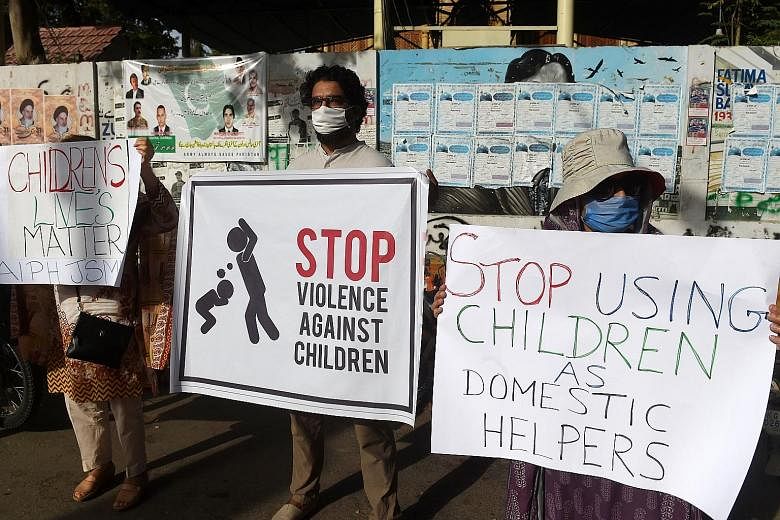Domestic violence against women
Nilima Adhikari
The Kathmandu Post, Nepal
Most of humanity is currently complying with mandatory stay-at-home orders and social distancing. But violence against women has increased globally amid the pandemic, and Nepal is no exception to this.
The Women's Rehabilitation Centre published a report on its official site saying it had documented 235 cases of violence against women. Among them, 133 were cases of domestic violence, 34 cases of rape, 10 cases of attempted rape, 10 cases of sexual assault, two cases of murder, two cases of suicide and four cases of cyber bullying.
Due to the home confinement, women's unpaid work has increased several-fold, leading to a mental and emotional health crisis.
Women who are battered by their husbands or in-laws or both inside the domestic sphere keep quiet due to fear of social stigma, concern for the children's well-being or economic insecurity.
Domestic violence and rigid patriarchal gender norms are an "everyday pandemic" for women even without the lockdown. But with the global virus outbreak, the everyday pandemic of domestic violence has expanded.
The acts of frightening, alienating and controlling through psychological and coercive force by men have caused difficulties for women to get basic support and privileges. This coercive control by men has intensified during this lockdown, pushing women to the margins.
During this pandemic, women are finding it difficult to get a judicial remedy against violence inflicted on them. The state should ensure their protection and physical, mental and economic well-being.
Fatal glitter of a starry world
Raja Murthy
The Statesman, India
The funeral in Mumbai on June 15 of actor Sushant Singh Rajput pointed again to the dark side of stardom, of its untimely deaths, troubled lives and suicidal torment.
The Patna-born Rajput, who died aged 34, chose to chase a rainbow to a fragile pot of gold with emotional risk. As with many others before him, he paid the price in what may have been his troubled few months made worse during this Covid-19 curse.
The young rising star's world came to a tragic sudden end, with the Mumbai police investigating what they say could be suicide.
The good side of the movie and sports world can be demanding levels of dedication, discipline, hard work - steps in the career ladder that Rajput was climbing, the same ladder that brought rare heights of success to Mahendra Singh Dhoni, whose life Rajput skilfully portrayed in the 2016 film M.S. Dhoni: The Untold Story.
However, the love of glitter and glamour hides a shadow of fatal risk. People see the lives of cricket and movie stars, their penthouses in Worli, bungalows in Bandra, and the BMWs and Mercedes chariots of wealth - but often do not see the price to pay: the emotional insecurity and uncertainty of a life where success and failure come measured in other people's perceptions, the perception of team selectors, directors and producers, the fickle audience.
Endless miseries of our children
Tasneem Tayeb
The Daily Star, Bangladesh
According to The Alliance for Child Protection in Humanitarian Action, 152 million children worldwide are involved in child labour and nearly half of them, around 73 million, are engaged in hazardous jobs.
Covid-19 is only going to exacerbate the problem. A blog posted by Unicef suggests that "increased parental mortality due to Covid-19 will force children into child labour, including the worst forms such as work that harms the health and safety of children".
While the possibility of a meteoric rise in forced child labour is a concern for the world community, for countries like Bangladesh - where, according to the United Kingdom-based Institute of Development Studies, around 1.2 million children are already involved in the "worst forms of child labour" - the challenges ahead are manifold.
Child domestic workers remain a major problem of the informal employment sector. From toddlers to juveniles, children are employed in households across the country as domestic workers. These children are subjected to all forms of abuse, from inhumane living conditions to sexual assault by employers, leading to death in some cases.
Despite the government having formed the Domestic Workers Protection and Welfare Policy (DWPWP) 2015 and amended the Labour Act 2013, the miseries of child domestic workers remain unaddressed.
The policymakers' inability to align the discrepancy of the age bar for employability of these little workers in the DWPWP and the Labour Act is a manifestation of their apathy towards this situation.
Then, there are boys and girls who work in various other segments of the informal economy: in factories, workshops, shops, tanneries and other small jobs. These children are not only often exposed to hazardous materials and chemicals, but they also fail to access basic necessities such as nutrition, healthcare and education.
The street children remain the most vulnerable group. These children are often involved in rag-picking, begging and other such tasks and miserably exploited by the people who employ them. Especially in the current situation, these children are at greater risk of being infected with Covid-19 because of the way we handle medical waste, especially outside the capital.
And with the nation's economic wheels slowing down due to Covid-19, these children are at a greater risk of exploitation by unscrupulous employers. With the equilibrium in the demand-supply equation of available child labour tilting towards the employers, it is the little children who will be the collateral damage.
• The View From Asia is a compilation of articles from The Straits Times' media partner Asia News Network, a grouping of 24 news media titles.


